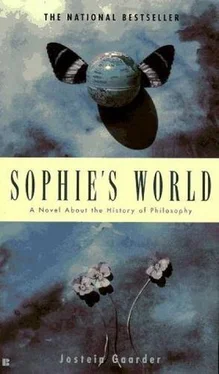Jostein Gaarder - Sophie's World - A Novel About the History of Philosophy
Здесь есть возможность читать онлайн «Jostein Gaarder - Sophie's World - A Novel About the History of Philosophy» весь текст электронной книги совершенно бесплатно (целиком полную версию без сокращений). В некоторых случаях можно слушать аудио, скачать через торрент в формате fb2 и присутствует краткое содержание. ISBN: , Издательство: BERKLEY BOOKS, NEW YORK, Жанр: Философия, на английском языке. Описание произведения, (предисловие) а так же отзывы посетителей доступны на портале библиотеки ЛибКат.
- Название:Sophie's World: A Novel About the History of Philosophy
- Автор:
- Издательство:BERKLEY BOOKS, NEW YORK
- Жанр:
- Год:неизвестен
- ISBN:0-425-15225-1
- Рейтинг книги:4 / 5. Голосов: 1
-
Избранное:Добавить в избранное
- Отзывы:
-
Ваша оценка:
- 80
- 1
- 2
- 3
- 4
- 5
Sophie's World: A Novel About the History of Philosophy: краткое содержание, описание и аннотация
Предлагаем к чтению аннотацию, описание, краткое содержание или предисловие (зависит от того, что написал сам автор книги «Sophie's World: A Novel About the History of Philosophy»). Если вы не нашли необходимую информацию о книге — напишите в комментариях, мы постараемся отыскать её.
Sophie's World: A Novel About the History of Philosophy — читать онлайн бесплатно полную книгу (весь текст) целиком
Ниже представлен текст книги, разбитый по страницам. Система сохранения места последней прочитанной страницы, позволяет с удобством читать онлайн бесплатно книгу «Sophie's World: A Novel About the History of Philosophy», без необходимости каждый раз заново искать на чём Вы остановились. Поставьте закладку, и сможете в любой момент перейти на страницу, на которой закончили чтение.
Интервал:
Закладка:
In the year 399 B.C. he was accused of “introducing new gods and corrupting the youth,” as well as not believing in the accepted gods. With a slender majority, a jury of five hundred found him guilty.
He could very likely have appealed for leniency. At least he could have saved his life by agreeing to leave Athens. But had he done this he would not have been Socrates. He valued his conscience—and the truth— higher than life. He assured the jury that he had only acted in the best interests of the state. He was nevertheless condemned to drink hemlock. Shortly thereafter, he drank the poison in the presence of his friends, and died.
Why, Sophie? Why did Socrates have to die? People have been asking this question for 2,400 years. However, he was not the only person in history to have seen things through to the bitter end and suffered death for the sake of their convictions.
I have mentioned Jesus already, and in fact there are several striking parallels between them.
Both Jesus and Socrates were enigmatic personalities, also to their contemporaries. Neither of them wrote down their teachings, so we are forced to rely on the picture we have of them from their disciples. But we do know that they were both masters of the art of discourse. They both spoke with a characteristic self-assuredness that could fascinate as well as exasperate. And not least, they both believed that they spoke on behalf of something greater than themselves. They challenged the power of the community by criticizing all forms of injustice and corruption. And finally—their activities cost them their lives.
The trials of Jesus and Socrates also exhibit clear parallels.
They could certainly both have saved themselves by appealing for mercy, but they both felt they had a mission that would have been betrayed unless they kept faith to the bitter end. And by meeting their death so bravely they commanded an enormous following, also after they had died.
I do not mean to suggest that Jesus and Socrates were alike. I am merely drawing attention to the fact that they both had a message that was inseparably linked to their personal courage.
A Joker in Athens
Socrates, Sophie! We aren’t done with him yet. We have talked about his method. But what was his philosophical project?
Socrates lived at the same time as the Sophists. Like them, he was more concerned with man and his place in society than with the forces of nature. As a Roman philosopher, Cicero, said of him a few hundred years later, Socrates “called philosophy down from the sky and established her in the towns and introduced her into homes and forced her to investigate life, ethics, good and evil.”
But Socrates differed from the Sophists in one significant way. He did not consider himself to be a “sophist”—that is, a learned or wise person. Unlike the Sophists, he did not teach for money. No, Socrates called himself a philosopher in the true sense of the word. A “philosopher” really means “one who loves wisdom.”
Are you sitting comfortably, Sophie? Because it is central to the rest of this course that you fully understand the difference between a sophist and a philosopher. The Sophists took money for their more or less hairsplitting expoundings, and sophists of this kind have come and gone from time immemorial. I am referring to all the schoolmasters and self-opinionated know-it-alls who are satisfied with what little they know, or who boast of knowing a whole lot about subjects they haven’t the faintest notion of. You have probably come across a few of these sophists in your young life. A real philosopher, Sophie, is a completely different kettle of fish—the direct opposite, in fact. A philosopher knows that in reality he knows very little. That is why he constantly strives to achieve true insight. Socrates was one of these rare people. He knew that he knew nothing about life and about the world. And now comes the important part: it troubled him that he knew so little.
A philosopher is therefore someone who recognizes that there is a lot he does not understand, and is troubled by it. In that sense, he is still wiser than all those who brag about their knowledge of things they know nothing about. “Wisest is she who knows she does not know,” I said previously. Socrates himself said, “One thing only I know, and that is that I know nothing.”
Remember this statement, because it is an admission that is rare, even among philosophers. Moreover, it can be so dangerous to say it in public that it can cost you your life. The most subversive people are those who ask questions. Giving answers is not nearly as threatening. Any one question can be more explosive than a thousand answers.
You remember the story of the emperor’s new clothes? The emperor was actually stark naked but none of his subjects dared say so. Suddenly a child burst out, “But he’s got nothing on!” That was a courageous child, Sophie. Like Socrates, who dared tell people how little we humans know. The similarity between children and philosophers is something we have already talked about.
To be precise: Mankind is faced with a number of difficult questions that we have no satisfactory answers to. So now two possibilities present themselves: We can either fool ourselves and the rest of the world by pretending that we know all there is to know, or we can shut our eyes to the central issues once and for all and abandon all progress. In this sense, humanity is divided. People are, generally speaking, either dead certain or totally indifferent. (Both types are crawling around deep down in the rabbit’s fur!)
It is like dividing a deck of cards into two piles, Sophie. You lay the black cards in one pile and the red in the other. But from time to time a joker turns up that is neither heart nor club, neither diamond nor spade. Socrates was this joker in Athens. He was neither certain nor indifferent. All he knew was that he knew nothing—and it troubled him. So he became a philosopher—someone who does not give up but tirelessly pursues his quest for truth.
An Athenian is said to have asked the oracle at Delphi who the wisest man in Athens was. The oracle answered that Socrates of all mortals was the wisest. When Socrates heard this he was astounded, to put it mildly. (He must have laughed, Sophie!) He went straight to the person in the city whom he, and everyone else, thought was excessively wise. But when it turned out that this person was unable to give Socrates satisfactory answers to his questions, Socrates realized that the oracle had been right.
Socrates felt that it was necessary to establish a solid foundation for our knowledge. He believed that this foundation lay in man’s reason. With his unshakable faith in human reason he was decidedly a rationalist.
The Right Insight Leads to the Right Action
As I have mentioned earlier, Socrates claimed that he was guided by a divine inner voice, and that this “conscience” told him what was right. “He who knows what good is will do good,” he said.
By this he meant that the right insight leads to the right action. And only he who does right can be a “virtuous man.” When we do wrong it is because we don’t know any better. That is why it is so important to go on learning. Socrates was concerned with finding clear and universally valid definitions of right and wrong. Unlike the Sophists, he believed that the ability to distinguish between right and wrong lies in people’s reason and not in society.
You may perhaps think this last part is a bit too obscure, Sophie. Let me put it like this: Socrates thought that no one could possibly be happy if they acted against their better judgment. And he who knows how to achieve happiness will do so. Therefore, he who knows what is right will do right. Because why would anybody choose to be unhappy?
What do you think, Sophie? Can you live a happy life if you continually do things you know deep down are wrong? There are lots of people who lie and cheat and speak ill of others. Are they aware that these things are not right—or fair, if you prefer? Do you think these people are happy?
Читать дальшеИнтервал:
Закладка:
Похожие книги на «Sophie's World: A Novel About the History of Philosophy»
Представляем Вашему вниманию похожие книги на «Sophie's World: A Novel About the History of Philosophy» списком для выбора. Мы отобрали схожую по названию и смыслу литературу в надежде предоставить читателям больше вариантов отыскать новые, интересные, ещё непрочитанные произведения.
Обсуждение, отзывы о книге «Sophie's World: A Novel About the History of Philosophy» и просто собственные мнения читателей. Оставьте ваши комментарии, напишите, что Вы думаете о произведении, его смысле или главных героях. Укажите что конкретно понравилось, а что нет, и почему Вы так считаете.












